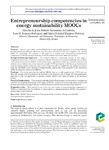| dc.contributor.author | Beltrán Hernández de Galindo, Martha de Jesús | |
| dc.contributor.author | Romero-Rodríguez, Luis M. | |
| dc.contributor.author | Ramírez-Montoya, María Soledad | |
| dc.date.accessioned | 2019-08-27T18:34:35Z | |
| dc.date.available | 2019-08-27T18:34:35Z | |
| dc.date.issued | 2019-08-09 | |
| dc.identifier.issn | 2053-4604 | |
| dc.identifier.doi | 10.1108/JEEE-03-2019-0034 | |
| dc.identifier.uri | http://hdl.handle.net/11285/633034 | |
| dc.description.abstract | Purpose – Massive open online courses (MOOCs) have been gaining popularity as non-formal lifelong learning educational platforms. However, they have been criticized for their low completion rate and low ability for networking. The purpose of this paper is to analyze how incorporating entrepreneurial competencies in MOOCs develops attributes of educational innovation and collaborative projects.
Design/methodology/approach – The research followed a three-stage process: in first stage, a comprehensive literature review was conducted to identify dimensions of entrepreneurial skills and attributes of educational innovation in MOOCs. In the second stage, a quantitative study was carried out, based on the analysis of pre- and post-test surveys taken by a sample of 6,517 participants. In the last stage, the interaction analysis model/computer-mediated communication analysis model was applied through qualitative analysis, using the MAXQDA tool to identify if entrepreneurship opportunities were generated in the interactions within the discussion forums of the MOOCs.
Findings – The results show that the analyzed MOOCs have an overall completion rate of 12.55 per cent, above the average of the rates found in the literature review. However, only 14.29 per cent of the participants expressed at least one opportunity to generate ventures related to the topics of energy in the discussion forums.
Practical implications – This research could help instructional designers and universities to consider the inclusion of entrepreneurship issues in the design of MOOCs’ content and to encourage more activities that promote networking among participants, to identify business potential from the educational materials.
Originality/value – This research is one of the very few studies on entrepreneurship competencies in MOOCs to understand how the inclusion of issues related to entrepreneurship in MOOCs can generate a positive impact on participants. | es_MX |
| dc.language.iso | eng | es_MX |
| dc.publisher | Emerald Group Publishing Ltd. | es_MX |
| dc.relation | his work was supported by the energy sustainability fund CONACYT-SENER through the Project 266632 ‘‘Laboratorio Binacional para la Gestión Inteligente de la Sustentabilidad Energética y la Formación Tecnológica’’ under Grant S0019201401. | es_MX |
| dc.relation.url | https://doi.org/10.1108/JEEE-03-2019-0034 | es_MX |
| dc.rights | Open Access | es_MX |
| dc.rights.uri | http://creativecommons.org/licenses/by-nc-sa/4.0/ | * |
| dc.subject.lcsh | Education | es_MX |
| dc.title | Entrepreneurship competencies in energy sustainability MOOCs | es_MX |
| dc.type | Artículo / Article | es_MX |
| dc.identifier.journal | Journal of Entrepreneurship in Emerging Economies | es_MX |
| dc.subject.keyword | Higher Education | es_MX |
| dc.subject.keyword | Entrepreneurship education | es_MX |
| dc.subject.keyword | Energy sustainability | es_MX |
| dc.subject.keyword | Entrepreneurship competencies | es_MX |
| dc.contributor.affiliation | Instituto Tecnológico y de Estudios Superiores de Monterrey | es_MX |
| dc.subject.lemb | Estados Unidos de América / United States | es_MX |

